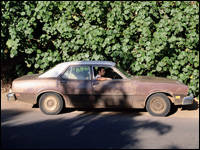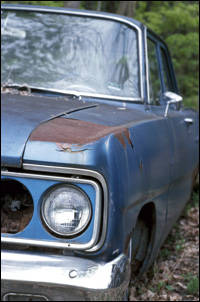Every fall it is the same story: Rustproofing companies begin an aggressive advertising campaign, corner garages put up signs displaying
their treatments and we get coupons in the mail... It is a seasonal topic but rust is always an issue. Many people are confronted by something they know they should do to protect their car but are often not certain as to what they should do.
Cars and trucks, even if they have received a factory or dealer applied rustproofing treatment, can begin to show important signs of rust after only 5 years. An independent treatment by a specialised outfit is usually the best way to go.
It is true that not everyone should get their vehicle treated. Those that intend on keeping their vehicles for an extended period of time should seriously consider getting it done. Not only will the car look better but over a 7 to 8 year span, it could prevent the replacement of parts such as brake lines, electrical connectors and of certain body panels such as lower door seams or rocker panels. On the other hand, those that are leasing for 3 or 4 years and that are not going to buy the car at the end of the contract do not need to bother with the investment.
One of the most common inquiries that consumers have is: When should
they get it done? Ideally it should be done when it is warmer outside so it is not necessary to wait until fall like most people do. The reason is simple, the milder temperatures will allow the products to better penetrate the treated areas. The metals will basically soak up the product.
Back in my days of consumer counselling, one of the best excuses that was given to consumers for not getting their vehicle treated was that the manufacturer's warranty would be voided. In fact, it will not. The car manufacturer is still responsible for rust problems that would be the result of defective parts or improper assembly. For example, if perforation occurs on the roof, this would be the carmaker's responsibility (since most rust proofing treatments are not applied in this area). On the other hand, if rust were to be found coming from one of the holes drilled by the rust proofing retailer for treatment application, this would classify as the rust retailer's responsibility. Let us not forget that most dealers attempt to sell new car buyers an after-market rustproofing. product ...
Now, once the consumer has decided to get the job done, they are faced with another decision to make: Which type of treatment is best for me? There are in fact two real types of treatments: The first is an annual oil treatment where holes are drilled into the body to permit a complete application. These treatments will work best only if it is repeated every year. The same goes for the warranty. The prices are usually between $60 and $110. The second option is a grease-based treatment that offers the best protection and best of all; most do not need touch-ups before 3 years have elapsed from the original application. The secret is in the 4 to 5 hour application time compared to 45 to 60 minutes for the oil. The
grease is applied via the removal of door cards, inner trim pieces and by backing off carpets.
There are many so-called "miracle" therapies available such as those using electronic or electric devices. I have heard and seen some of these treatments and as far as I can tell, all of them require specific circumstances for them to work, if they do at all. For example, there are devices that provide something called Cathodic protection. This system basically generates a field of electricity around an item and prevents rust from forming on it. It actually works; the catch is that the vehicle would have to be submerged in water for the current to flow and for the protection to occur. This is why this type of defence is ideal for boats and bridges.
I do you have a few recommendations as to where people should go. Actually, my friends at the Automobile Protection Association have 2 specific tried, tested and true recommendations. You can contact them by visiting their website at (www.apa.ca) or by calling them at 514-272-5555.
 |
Cars and trucks, even if they have received a factory or dealer applied rustproofing treatment, can begin to show important signs of rust after only 5 years. An independent treatment by a specialised outfit is usually the best way to go.
It is true that not everyone should get their vehicle treated. Those that intend on keeping their vehicles for an extended period of time should seriously consider getting it done. Not only will the car look better but over a 7 to 8 year span, it could prevent the replacement of parts such as brake lines, electrical connectors and of certain body panels such as lower door seams or rocker panels. On the other hand, those that are leasing for 3 or 4 years and that are not going to buy the car at the end of the contract do not need to bother with the investment.
One of the most common inquiries that consumers have is: When should
 |
Back in my days of consumer counselling, one of the best excuses that was given to consumers for not getting their vehicle treated was that the manufacturer's warranty would be voided. In fact, it will not. The car manufacturer is still responsible for rust problems that would be the result of defective parts or improper assembly. For example, if perforation occurs on the roof, this would be the carmaker's responsibility (since most rust proofing treatments are not applied in this area). On the other hand, if rust were to be found coming from one of the holes drilled by the rust proofing retailer for treatment application, this would classify as the rust retailer's responsibility. Let us not forget that most dealers attempt to sell new car buyers an after-market rustproofing. product ...
Now, once the consumer has decided to get the job done, they are faced with another decision to make: Which type of treatment is best for me? There are in fact two real types of treatments: The first is an annual oil treatment where holes are drilled into the body to permit a complete application. These treatments will work best only if it is repeated every year. The same goes for the warranty. The prices are usually between $60 and $110. The second option is a grease-based treatment that offers the best protection and best of all; most do not need touch-ups before 3 years have elapsed from the original application. The secret is in the 4 to 5 hour application time compared to 45 to 60 minutes for the oil. The
 |
There are many so-called "miracle" therapies available such as those using electronic or electric devices. I have heard and seen some of these treatments and as far as I can tell, all of them require specific circumstances for them to work, if they do at all. For example, there are devices that provide something called Cathodic protection. This system basically generates a field of electricity around an item and prevents rust from forming on it. It actually works; the catch is that the vehicle would have to be submerged in water for the current to flow and for the protection to occur. This is why this type of defence is ideal for boats and bridges.
I do you have a few recommendations as to where people should go. Actually, my friends at the Automobile Protection Association have 2 specific tried, tested and true recommendations. You can contact them by visiting their website at (www.apa.ca) or by calling them at 514-272-5555.


